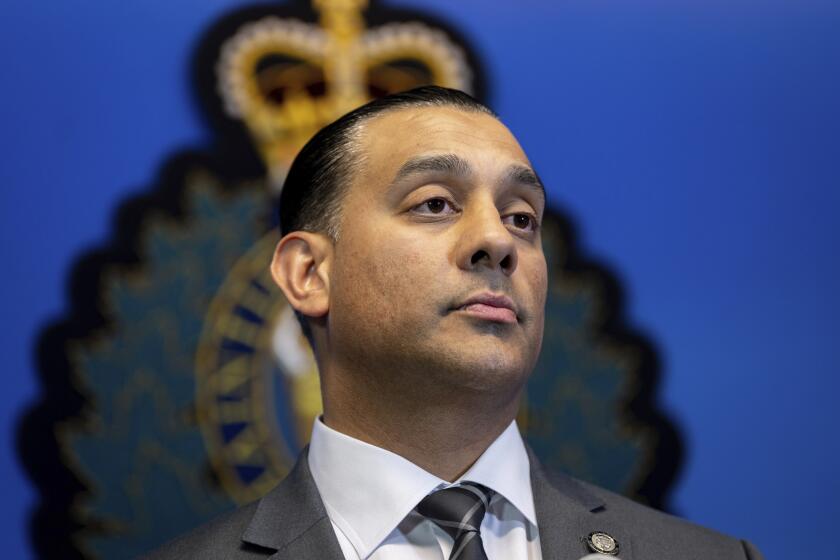Vote may chart new course for S. Africa
When the man who would be South Africa’s next president appeared on the front page of a national daily wearing a black cowboy hat with a red hammer and sickle, it did not signal any headline-grabbing shift to communism. But it did raise the question, who is Jacob Zuma?
Zuma had just returned from a trip to the United States, Europe and India to allay investor fears of any sharp economic turn should he be chosen the leader of the ruling African National Congress at its conference that begins today. Yet at a gathering of the South African Communist Party last weekend, he dropped hints of a more socialistic approach.
The former vice president has been playing to different audiences with minimal policy comment, a strategy that has him as front-runner to win the party presidency, despite facing potential corruption charges. If he defeats his bitter enemy, South African President Thabo Mbeki, for the post, he would be heir apparent to lead the country after the 2009 presidential election, which the ANC is expected to win.
Zuma, 65, is a flamboyant and controversial figure who has a common touch Mbeki lacks. His trademark is the song “Umshini Wami,” a war anthem that translates loosely as “Bring Me My Machine (Gun).” His supporters are often seen in traditional Zulu dress or T-shirts with the slogan, “100 percent Zuluboy.”
He is a polygamist reported to have married three wives and fathered 20 children, but he keeps his family life private. Last year, he was acquitted on charges of rape; he said the encounter was consensual.
In a sign of Zuma’s appeal to the different constituencies in the party, of which he is deputy president, the man whose views on sex and AIDS raised eyebrows at his rape trial won the endorsement of the ANC Women’s League in the run-up to the leadership vote.
The contest has become the most divisive in the party of Nelson Mandela since the end of apartheid in 1994. Some analysts see it as potentially a mini-revolution that could see the Zuma camp taking over ANC executive positions, marking a spectacular fall from grace for Mbeki and his Cabinet allies.
In the bitter final weeks, the party has been stunned by revelations that hundreds of thousands of dollars were offered in a bid to buy votes. The party secretary-general did not identify who offered the bribes, but many accused the Mbeki camp of last-minute dirty tricks.
The Congress of South African Trade Unions and the Communist Party, which want a bigger say in governing South Africa, form the backbone of Zuma’s campaign. They are allied with the ANC but complain that Mbeki has marginalized them.
Mbeki, whose national approval rating slumped to 40% in October, is seen as remote, authoritarian and out of touch. He is under fire by the Zuma camp, who accuse him of failing to take crime seriously and for refusing to condemn human rights abuses in neighboring Zimbabwe.
“Mbeki is panicking at the moment. He’s lost support. He’s become a lone ranger,” said Sipho Seepe, political columnist with Business Day. “He suffers from the notion that he’s endowed with infinite wisdom. The momentum to confront him has been building for some time.”
After failed efforts to find a compromise candidate to limit the damage to the party, the ANC has been rocked by the fallout from the battle.
Trade Unions boss Zwelinzima Vavi caused a storm of controversy recently when he said many of those who support gender parity in the ANC were “legendary womanizers who want 50/50 representation so they can take advantage of the women they voted into power.” Many took the comments as directed at Mbeki, who has been pushing the issue as part of his bid for reelection as party president.
Mbeki, who has been president for eight years, leaves office in 2009, barred by the constitution from seeking a third term. If he is reelected as party boss, he would be able to choose his successor.
Zuma was fired as the country’s vice president in 2005 after his financial advisor, Schabir Shaik, was convicted of soliciting a bribe for him in a multibillion-dollar arms deal. The case against Zuma was dismissed last year when the prosecution sought more time, but a recent judgment has opened the possibility of charges being refiled.
A conviction would make Zuma ineligible for president. His supporters claim the corruption case is an instance of Mbeki misusing his power to block his rival.
In a recent survey of 2,000 South Africans, a quarter named Zuma as their preferred successor to Mbeki. But many others see him as tainted. Last year Anglican Archbishop Desmond Tutu described Zuma as unfit for office after his rape trial testimony. In comments to the Sowetan newspaper last month, the Nobel Peace Prize laureate appealed to the ANC not to elect someone of whom the country would be ashamed.
Although Zuma was acquitted, his testimony that he had unprotected sex with a family friend half his age, who he knew was HIV-positive, shocked the country. Particularly controversial were his assertions that his accuser, 31, was asking for sex because she was wearing a knee-length skirt and that in Zulu culture you risk rape charges if you leave an aroused woman unfulfilled. He also said that he took a shower afterward to reduce the risk of getting HIV/AIDS.
A Zuma win would put a question mark on South Africa’s economic policy at a particularly delicate time: Though the country’s economic growth has crept above the 6% target, its current budget deficit recently reached a 25-year record.
Zuma’s political debt to the trade unions and Communists might alarm investors, with expectations their loyalty would be rewarded with government jobs, not just vague promises of a greater policy role. The unions want major changes to economic policy, including higher social spending and increased taxes on businesses and the rich.
A Zuma win would also raise questions about whether Finance Minister Trevor Manuel and Reserve Bank chief Tito Mboweni, both seen by the business community as linchpins of South Africa’s post-apartheid economic success, would remain in the Cabinet.
Analysts were mystified at how Zuma won the nomination of the ANC Women’s League, even though an Mbeki victory would see three women in the top six party posts, instead of the one promised by Zuma. But Mbeki lost support among ANC women with his clumsy firing of the popular deputy health minister, Nozizwe Madlala-Routledge, soon after she released a report showing high infant mortality rates at a government hospital. Madlala-Routledge had received widespread acclaim for reshaping HIV/AIDS policy.
“I think this year has been a bad year for him,” said Mail and Guardian political analyst Rapule Tabane. “When he fired the deputy health minister the day before Women’s Day, people felt she was victimized for telling the truth. It came across as a total miscalculation.”
As Mbeki’s approval rating plummeted this last year, his efforts to repair his image at times had the whiff of desperation. In comments to the ANC parliamentary caucus, Mbeki urged its members not to let the party be run by rapists and criminals. Many took the comments as a dig at Zuma.
Some analysts contend that if elected, Zuma will end centrist politics in the ANC.
“Zuma, if he wins, will inherit a weakened presidency and one that will be kept on its toes by the party and the Parliament,” said Zwelethu Jolobe, a political analyst at the University of Cape Town. But others predict that once in office, Zuma might consult with and placate the trade unions and Communists a little more but that the real levers of power would not change much.
A big question mark also hangs over Mbeki’s future. If Zuma’s camp gets control of the party’s national executive committee, Mbeki will be surrounded by fierce critics determined to make him more accountable. Some opponents have already made noises about trying to force an early election before his term expires.
More to Read
Start your day right
Sign up for Essential California for news, features and recommendations from the L.A. Times and beyond in your inbox six days a week.
You may occasionally receive promotional content from the Los Angeles Times.






